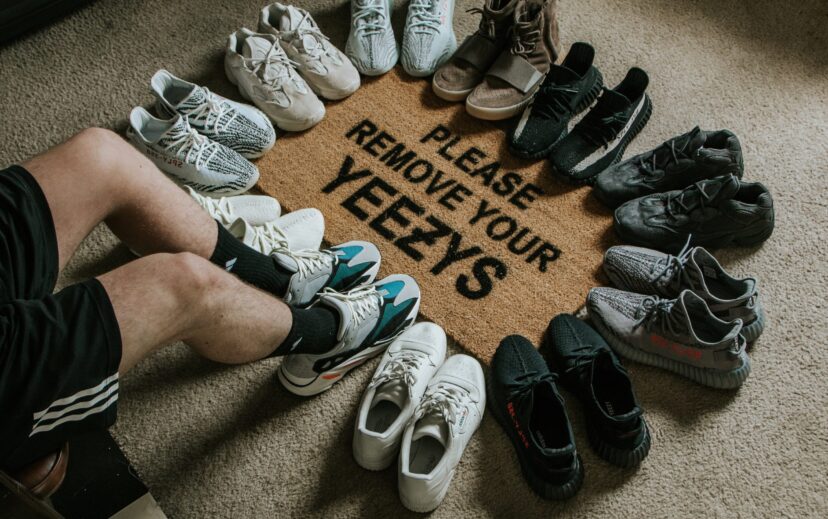In a series of legal battles, Walmart and Kanye West, along with his company Yeezy, contested each other over intellectual property ownership.
What Were the Two Disputes Between Kanye West and Walmart?
In the first dispute, Walmart raised objections to Yeezy’s trademark application for a logo resembling a sun, claiming it closely mirrors the retail giant’s own sun logo.
In the second dispute, West and Yeezy sued Walmart alleging it had been marketing and selling “virtually indistinguishable” versions of the Yeezy Foam Runners. West and Yeezy alleged false advertising and unfair competition under both California and federal laws.
While these are distinct legal actions, both suits argue that the use of similar trademarks and designs by the opposing party creates confusion among consumers, falsely implying that the brands are collaborating.
They each contended that this association diluted the value of their respective brands. Yeezy asserted that any perceived connection with Walmart, a discount retailer, diminishes its standing as a high-end fashion clothing line, and Walmart, as a global brand, argued that being associated with Yeezy would be detrimental to its reputation.
How Can Walmart Oppose Yeezy’s Trademark Registration?
Under federal trademark law, parties can register their trademarks with the U.S. Patent and Trademark Office (USPTO). Although registration is not mandatory, it is advisable as it grants trademark owners additional legal protections and enforcement rights.
- Resemblance
During the process of federal trademark registration, third parties can contest applications if the prospective trademark is confusingly similar to their own registered mark.
Here, Walmart opposed the registration of Yeezy’s logo, alleging that it closely resembled Walmart’s own “rays from a sun” logo that has been in use since 2007. Walmart claimed that this likeness could create confusion regarding the source of Yeezy’s products and services, potentially implying a false affiliation with Walmart. This was particularly relevant as Walmart has previously partnered with celebrities, making it likely for consumers to assume a similar collaboration with Yeezy and West.
- Competition
Walmart also argued that Yeezy sought to use the logo for a wide range of goods and services, many of which were in direct competition with Walmart, including musical recordings, clothing, retail services, streaming, and entertainment venues.
- Trademark Dilution
Walmart further asserted that Yeezy’s trademark approval would dilute Walmart’s trademark. Trademark dilution occurs when unauthorized use of a “famous” mark weakens or tarnishes its value. For a trademark dilution claim, the trademark owner does not need to demonstrate a likelihood of consumer confusion, nor do the products or services need to be similar to or in competition with the original mark.
Has Walmart Engaged in Unfair Competition?
West and Yeezy sued Walmart under California’s Unfair Competition Law (UCL) and the U.S. Lanham Act, based on Walmart’s alleged imitation of the Foam Runners. Unfair competition encompasses a wide range of deceptive, misleading, or fraudulent conduct that harms other businesses or individuals economically. Yeezy and West argued that the similarities between the shoes have led to consumer confusion about the association between Walmart and Yeezy, thereby diluting Yeezy’s brand.
The UCL prohibits unlawful, unfair, or fraudulent business practices, as well as misleading or false advertising. Unlawful practices encompass those that violate federal, state, or municipal laws. Unfair practices include actions that go against established public policies or are considered immoral, unethical, oppressive, unscrupulous, or substantially harmful to consumers. Fraudulent practices are likely to deceive the public.
False advertising is also forbidden under California law and the federal Lanham Act. To prevail in such cases, the plaintiff must demonstrate that the advertising statements are untrue or misleading and that the defendants either knew or should have known, with reasonable care, that the statements were inaccurate or deceptive.
Consumer Confusion and Damage to Sales and Reputation
The plaintiffs argued that Walmart’s shoes are nearly identical to the Foam Runners, leading to consumer confusion and potentially damaging Yeezy’s sales and reputation. They cited customer comments on the Walmart website, where customers indicated they might have purchased Yeezy’s shoes if not for Walmart’s imitation, or they mistakenly believed Walmart was selling the genuine Yeezy shoes. Additionally, customers who purchased Walmart’s shoes thinking they were Foam Runners expressed dissatisfaction with the quality. The plaintiffs alleged that Walmart’s sale of a similar-looking, lower-priced, and allegedly lower-quality product harmed Yeezy’s sales and reputation.
Notably, Walmart contended that the shoes were offered by a third-party seller on its website, and Walmart has since removed the products from its site.
Conclusion
West and Yeezy ultimately settled their lawsuit against Walmart, and Yeezy applied for a new trademark in 2022. Details regarding their settlement remain undisclosed.
Trademark law offers vital protection to brands of all sizes, making it essential for even smaller companies to pay attention to these cases to understand how to safeguard their rights and avoid potential legal liabilities from trademark infringement. To avoid infringing on another brand’s rights and to protect one’s own, consult Romano Law for more information about trademark registration and infringement.


